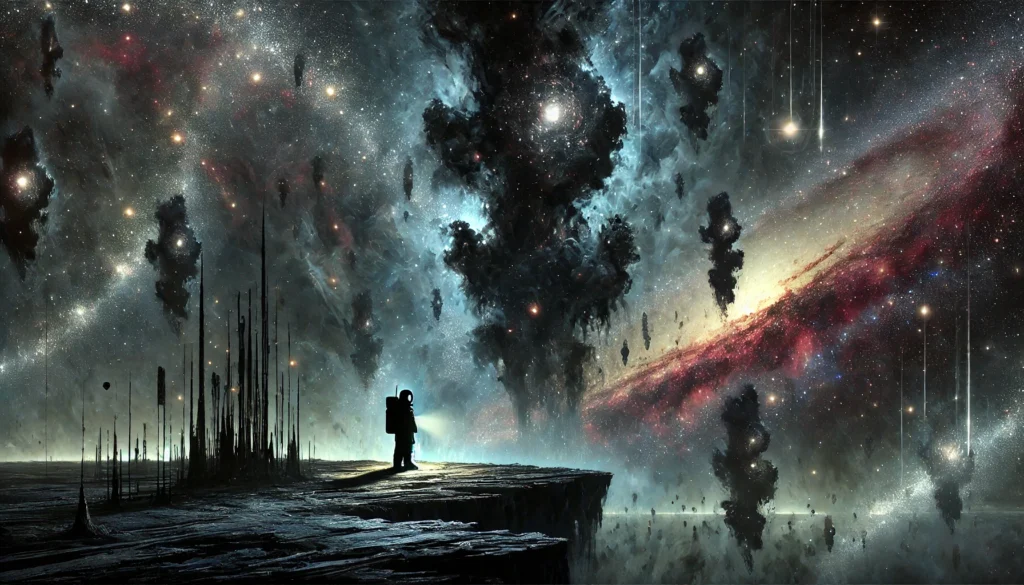The universe is vast, spanning billions of light-years with an unimaginable number of stars and planets. Given these staggering numbers, many scientists and thinkers have long been puzzled by the Fermi Paradox: If intelligent life is so probable, why haven’t we encountered any evidence of it? One speculative yet deeply unsettling answer comes from Liu Cixin’s The Dark Forest, a science fiction novel that presents a theory known as the “Dark Forest Theory.”

What Is the Dark Forest Theory?
The theory, derived from the second book of Liu’s The Three-Body Problem trilogy, likens the cosmos to a dark forest. In this forest:
- Every civilization is a hunter silently navigating the shadows.
- Each one knows that others are out there, but they remain hidden to avoid detection.
- Revealing one’s location could invite a fatal attack, as no civilization can risk the potential hostility of another.
The logic is simple but profound: because any encounter between civilizations might result in existential conflict, the safest option is to stay silent and unseen.
The Premise: Self-Preservation at Any Cost
The basis of the Dark Forest Theory is built on fundamental principles of self-preservation and risk mitigation. In this hypothetical framework:
- Survival is the top priority: Every civilization must ensure its own continuity.
- Unknowns are dangerous: A civilization cannot determine if another will be friendly or hostile.
- Preemptive strikes: To avoid being preemptively attacked themselves, civilizations may take the first move if they detect others, eliminating potential threats.
This mirrors the age-old problem of trust in game theory, where any party involved must act in a way that anticipates the worst-case scenario to safeguard their interests.
Scientific Thoughts That Parallel the Dark Forest Theory
While the Dark Forest Theory originates from a fictional setting, aspects of it align with established scientific and philosophical ideas about cosmic survival and existential risk:
1. The Zoo Hypothesis
Proposed in the 1970s, the Zoo Hypothesis suggests that extraterrestrial civilizations are aware of us but choose not to interact, either to allow for natural evolution or because we are not deemed advanced enough. This hypothesis shares the theme of self-imposed isolation found in the Dark Forest Theory, hinting at the possibility that advanced civilizations may avoid contact to maintain a kind of cosmic status quo.
2. Great Filter Hypothesis
The Great Filter suggests that a barrier exists that prevents civilizations from progressing to a stage where they can communicate across the stars. If advanced civilizations are aware of this filter, they might take proactive steps to remain hidden, avoiding any event that could trigger an existential risk, such as revealing their location to a potentially hostile civilization.
3. Anthropic Reasoning
Anthropic reasoning, specifically the idea that we must consider the conditions necessary for our existence when speculating about the universe, may provide indirect support for the Dark Forest Theory. If all civilizations that openly broadcast their existence have been wiped out by more advanced or cautious ones, the only surviving civilizations would be those that have chosen to stay silent and hidden. We might be part of such a cautious civilization—or one of the few that has yet to face this existential choice.

Cosmic Silence: Practical Considerations
Research into the Search for Extraterrestrial Intelligence (SETI) has produced no definitive results, despite decades of scanning the skies for signals. This silence itself could be telling. If the universe were full of life that freely communicated, we would likely have detected it by now. The lack of observable activity could imply that the Dark Forest Theory holds a kernel of truth.
Technological Precautions and Stealth
From a practical standpoint, a civilization capable of interstellar communication would also understand the risks associated with revealing its position. The development of technology, such as cloaking devices or advanced methods to suppress detectable emissions, would likely be a priority for any species that wants to ensure its safety. On Earth, military technology already incorporates stealth as a core principle; it is reasonable to assume that extraterrestrial civilizations would take this further.
The Moral and Ethical Dimensions
If the Dark Forest Theory is accurate, it raises profound questions about how humanity should proceed. Should we continue to broadcast signals into space, such as those sent with the Arecibo Message or the Voyager probes? Are these acts reckless in a universe where silence might be the key to survival?
Some scientists advocate caution, aligning with the thought that revealing our presence could make us a target. Stephen Hawking once warned against actively attempting to contact extraterrestrial civilizations, comparing potential encounters to the arrival of Europeans in the Americas, which did not turn out well for the indigenous populations.
Conclusion: A Silent Universe
The Dark Forest Theory presents an unsettling but logically consistent explanation for why we may not have heard from other civilizations. It suggests that in a universe where the stakes are existential, silence and invisibility might be the strategies of the wise. This theory is speculative but worth considering as we move forward in our search for extraterrestrial life. It calls for a balance between curiosity and caution, urging humanity to understand the potential consequences of reaching out into the dark forest of the cosmos.
The question remains: Are we the silent hunters in the shadows, or the oblivious creatures drawing attention in a dangerous place? Only time—and perhaps the silence of the universe—will tell.




